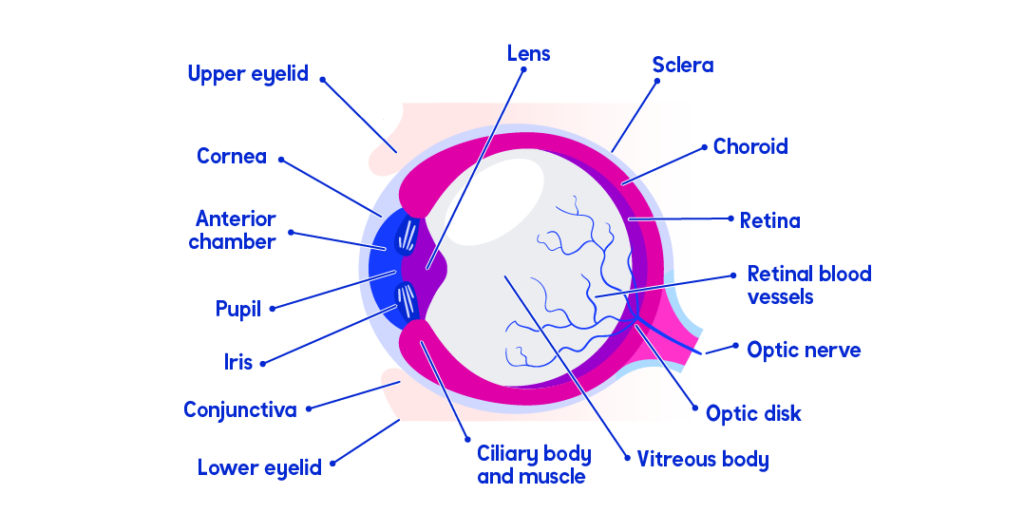Updated on November 10, 2022

English vocabulary for going to the optician

When you’re in a foreign country where you’re not fluent in the language, it helps to know at least a few key phrases for dealing with illness or an emergency. Knowing the right English words and phrases saves you a lot of time and trouble – and may even save your life. If you have problems with your vision, one place you may have to visit is the optician (the doctor who specializes in eyes). Here are English words and phrases that will help you communicate and get the help you need.
In case you need to visit the optician, these English words and phrases help you describe what you might need in terms of treatment, as well as understand what instructions and recommendations the optician gives.
Quick note: if you need to describe issues with other parts of your body, take a look at other useful vocabulary for doctor’s visits here.
There are many small parts of the eye with specific medical terminology. You can get a visual perspective from the below image:

It’s not absolutely necessary to know all of these words in detail before you visit the optician, but understanding a few of the basics can help you communicate more easily with your doctor.
Depending on the specific location or country’s healthcare system, you may have to visit a general practitioner (GP, a general medical doctor) or another type of eye doctor before going to the optician. Here is a list of professionals you can visit for eye problems and what they do:
| Type of eye professional | What they specialize in |
| Optometrist | A professional who tests, diagnoses, treats, and manages vision problems. |
| Ophthalmologist | A medical doctor who specializes in diagnosing and treating diseases of the eye. |
| Optician | A professional who designs, fits, and dispenses eyeglasses, contact lenses, and other devices to correct your eyesight. |
If you have problems with your vision in particular, it’s ideal to go first to an optometrist. They would then either recommend that you go to an ophthalmologist if you need further evaluation or they might prescribe lenses that the optician can design for you.
If you already have a lens prescription or need to have your glasses adjusted or repaired, you can go directly to an optician. They will take your facial measurements and help you choose the type of lens and frames that fits your individual needs.
During an eye examination, an optician will likely ask that you undergo a few vision tests. Here are the phrases an eye care professional may use while they examine your eyes or design the correct devices for you. Here are some words to prepare you for an eye test:
| Word or phrase | Definition |
| Snellen chart | A chart used by optometrists and ophthalmologists to check for vision problems. Letters of varying sizes are printed on the chart and it is used to check for your ability to see details clearly from a distance. |
| Visual acuity | This refers to your eyes’ ability to distinguish shapes, letters, and objects at various distances. |
| Refraction test | This is a part of the eye examination where the eye professional asks you to look at objects through a device while they place lenses of different strengths in front of your eyes. This test helps them determine your eyeglass prescription. |
| Accommodation | This refers to your eyes’ ability to focus on objects at varying distances. |
| Depth perception | This refers to your ability to judge the relative distances of objects. |
| Peripheral vision | This refers to your ability to see or be aware of objects on your sides. |
Here is some terminology for common eye and vision problems you may hear at the eye doctor. The optometrist or ophthalmologist may use them to describe your problem. Here is some useful ophthalmology vocabulary:
| Word or phrase | Definition |
| Myopia | A condition where far away objects are not seen clearly. This is also called “nearsightedness”. |
| Hyperopia | A condition where nearby objects are not seen clearly. This is also called “farsightedness”. |
| Photophobia | A condition where the eyes can’t handle bright lights. |
| Presbyopia | A condition where the eyes have difficulty focusing at all distances. This is caused by aging of the eyes and is common among people over the age of 40. |
| Strabismus | In this condition, there is a lack of coordination between the eyes. This is also called “crossed eyes”. |
| Astigmatism | In this condition, the eyes cannot focus light uniformly, resulting in blurred vision and eyestrain. |
Once your vision problem has been diagnosed, the ophthalmologist or optometrist might recommend a corrective device that you can then get from the optician (or sometimes separately from another company at a reduced cost). Here are three of the most common:
| Word or Phrase | Definition |
| Prescription lenses | These are framed glasses that are designed specifically for you to improve your vision. |
| Contact lenses | These are thin plastic lenses that are placed directly on the surface of the eyes to improve your vision. |
| Progressive lenses | These are lenses that could have either two (bi-focal) or more (multi-focal) prescriptions in one pair of glasses. These are for people who have problems seeing objects from both near and far distances. |
Whether these devices are covered by your health insurance depends heavily on your country’s healthcare system and specific insurance provider. If you’re living or traveling abroad, it’s highly recommended to check your level of coverage before undergoing tests or treatment from an optician in order to understand if you have to cover any of the associated costs on your own.
For more information, take a look at our country-specific health insurance guides for: